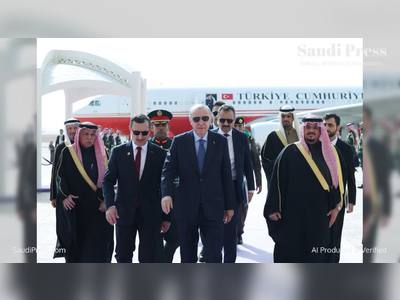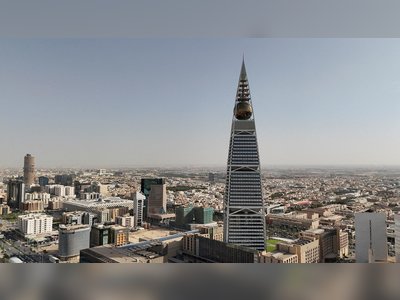
Rapid Growth of Saudi Film Industry Driving Job Creation and Economic Transformation
The lifting of the cinema ban has propelled Saudi Arabia's film industry into a key driver of job creation and economic diversification.
Since lifting the cinema ban in 2018, Saudi Arabia has made significant strides in transforming its film industry into a crucial engine for job creation and economic diversification.
Over 630 cinema screens have been opened across 60 locations, with an ambition to exceed 1,000 by 2030.
This growth is expected to create over 7,000 direct and indirect jobs, contributing to a broader entertainment ecosystem projected to generate approximately 450,000 employment opportunities and push the sector's gross domestic product contribution to 4.2 percent by the end of the decade.
By investing over SR3.5 billion ($933 million) in cinema infrastructure, content services, and technology, both local and international players have extended their investments beyond major cities into developing regions, promoting more inclusive economic growth.
A notable example is Muvi Cinemas, the first Saudi-owned cinema brand that has rapidly expanded to become market leader, employing hundreds of Saudis through training programs focused on building local capabilities in cinema operations and management.
The box office revenues have remained steady at SR900 million annually over the past three years, with food and beverage sales contributing over SR500 million each year.
This underscores the sector's role in diversifying Saudi Arabia's non-oil revenue streams.
The growth of the film industry is also supported by regulatory incentives from the Film Commission, which is laying the groundwork for sustainable industry growth.
Entities like the Film Commission and the General Entertainment Authority, alongside the development of advanced studios, have opened up new opportunities in creative, technical, and support roles.
This momentum has fueled demand for film and media education.
Additionally, initiatives such as the Red Sea International Film Festival are boosting local tourism and ancillary sectors including entertainment, food, media, and digital content.
Saudi Arabia is positioning itself as an international production hub by combining geographic diversity, government incentives, and growing infrastructure.
The country aims to produce 100 feature films by 2030, a move expected to unlock opportunities in tourism and hospitality.
Partnerships with global production companies are increasing, while training programs and workshops are being rolled out to develop local talent.
Despite the challenges of building a skilled workforce and navigating cultural sensitivities, the Saudi film industry is poised for growth.
By 2025, it is expected to create thousands of new jobs across related industries.
The development of Arabic-language content, forming public-private partnerships to support talent pipelines and infrastructure, and exporting Saudi films to neighboring markets are key opportunities for future growth.
Over 630 cinema screens have been opened across 60 locations, with an ambition to exceed 1,000 by 2030.
This growth is expected to create over 7,000 direct and indirect jobs, contributing to a broader entertainment ecosystem projected to generate approximately 450,000 employment opportunities and push the sector's gross domestic product contribution to 4.2 percent by the end of the decade.
By investing over SR3.5 billion ($933 million) in cinema infrastructure, content services, and technology, both local and international players have extended their investments beyond major cities into developing regions, promoting more inclusive economic growth.
A notable example is Muvi Cinemas, the first Saudi-owned cinema brand that has rapidly expanded to become market leader, employing hundreds of Saudis through training programs focused on building local capabilities in cinema operations and management.
The box office revenues have remained steady at SR900 million annually over the past three years, with food and beverage sales contributing over SR500 million each year.
This underscores the sector's role in diversifying Saudi Arabia's non-oil revenue streams.
The growth of the film industry is also supported by regulatory incentives from the Film Commission, which is laying the groundwork for sustainable industry growth.
Entities like the Film Commission and the General Entertainment Authority, alongside the development of advanced studios, have opened up new opportunities in creative, technical, and support roles.
This momentum has fueled demand for film and media education.
Additionally, initiatives such as the Red Sea International Film Festival are boosting local tourism and ancillary sectors including entertainment, food, media, and digital content.
Saudi Arabia is positioning itself as an international production hub by combining geographic diversity, government incentives, and growing infrastructure.
The country aims to produce 100 feature films by 2030, a move expected to unlock opportunities in tourism and hospitality.
Partnerships with global production companies are increasing, while training programs and workshops are being rolled out to develop local talent.
Despite the challenges of building a skilled workforce and navigating cultural sensitivities, the Saudi film industry is poised for growth.
By 2025, it is expected to create thousands of new jobs across related industries.
The development of Arabic-language content, forming public-private partnerships to support talent pipelines and infrastructure, and exporting Saudi films to neighboring markets are key opportunities for future growth.











